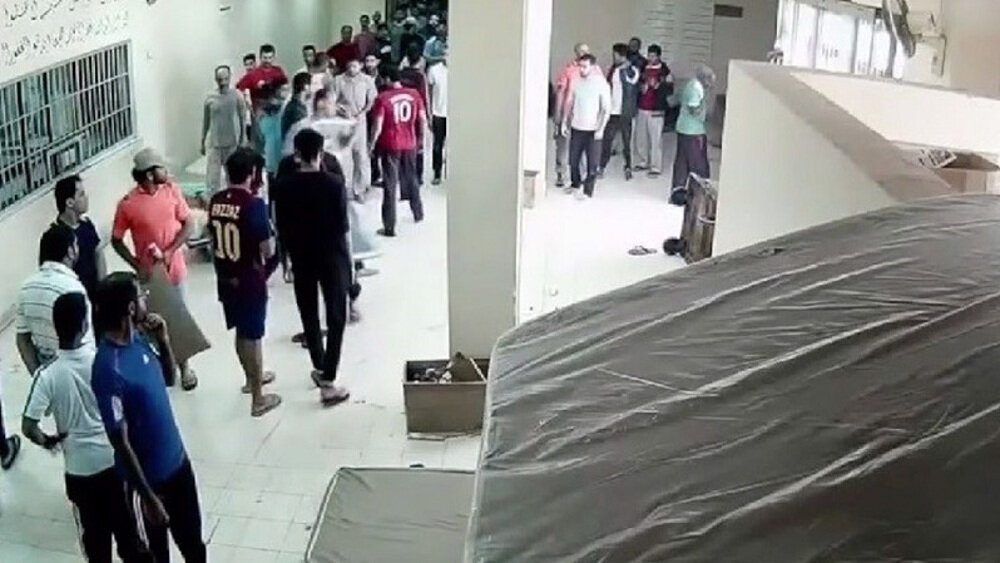Manama turns deaf ear to detainees’ empty stomachs

Hundreds of prisoners of conscience in Bahrain have embarked on a hunger strike – since the beginning of August – to protest against medical negligence and inhumane treatment that violates the most basic international standards for the treatment of prisoners.
This hunger strike is not the first of its kind in the country’s gloomy history, but it is now gaining attention with its continuation for the second week in a row, as hundreds have found that the battle of empty stomachs might restore some of their arbitrarily infringed rights.
Those political detainees protest against the deteriorating human conditions in prison, whereby they are enforced to drink water from detergent bottles. They are enforced to eat their unhealthy meals on plastic garbage bags instead of plates. They take turns sleeping due to lack of space. They are punished by enforced disappearance, which is the preferred punishment for the guards in the notorious Jau Central Prison’s administration. They are not allowed to freely exercise their religious freedoms. Their privacy is violated. They are deprived of sunbathing & meeting their extended families. They are denied education. Sectarian insults are inflicted on them on a daily basis. In short, 1300+ prisoners of conscience are currently crammed into tiny cells alongside criminal prisoners in an environment unfit for human habitation.
Multiple rights organisations have repeatedly pushed for allowing the relevant UN rapporteurs to visit the prison in a bid to ensure that the Jau Central Prison’s administration respects its international obligations towards detainees. Nonetheless, its repeated refusal and deliberate denial confirms its violation of these obligations and even its insistence on mistreating those prisoners of conscience.
In any popular movement, the empty stomach strike is a method of peaceful resistance against tyranny and injustice; a strike that does not damage the state’s facilities and the interests of the people. It is a confrontation between defenceless individuals who have nothing but their stomachs to protest, and an oppressive authority that possesses all the elements of brutality. It is an unequal confrontation, but – in the uprisings of rights and freedoms – it becomes more like a martyrdom operation in which those sacrifice themselves to pave the way for their marginalised people, and to raise the torch of freedom. It is a resistance in favour of the march of liberation from dictatorship.
Despite the scorching summer heat, hundreds of political prisoners in Bahrain are now on hunger strike to express their rejection of the violations they are subjected to, just as the Palestinians are striking in the prisons of the Zionist entity. In both cases, the executioner is unjust, but the paradox is that in the case of some Palestinian prisoners, the Zionist apartheid regime is -sometimes- forced to submit, whereby the slender bodies triumph over its imperialist tyranny. As for the Bahraini detainees, they are vulnerable not because of lacking perseverance, but rather because of the arrogance of an authority that has disregarded their wellbeing to an extent that overweight even the fascist regimes.
Another important issue is that the usurping Zionist entity – known for its racism, barbarity and oppression – fears the pressure of international human rights organizations, and is keen on its image in the West. Further, Tel Aviv is keener on its image, that is why it gets forced to acquiesce. Whereas, the Bahraini regime does not care because it knows -in advance- that it enjoys external support.
Likewise, the Western regimes do not care about the reputation of the Bahraini regime, because -in their view- it is a functional regime whose only mission is to protect the Western interests. While the Zionist entity is a colonist tool for realising its hegemonic project in West Asia. Obviously, there is a difference. The Bahraini regime has outperformed the model of the Zionist entity. It can be said that the student has far outperformed its teacher, and therefore, the empty stomachs of Bahrain’s political prisoners are unable to beat the drums on Manama’s hardened minds, thus realizing the simplest human rights.
It is noteworthy to point out that Manama’s official oversight bodies, specifically the so-called “Ombudsman”, is nothing but a means to legitimise violations, and not to reform prisons. Despite its alleged independent nature, it does not deviate from official frameworks. It is a security institution par excellence whose function is to defend the exclusionary political doctrine, defame the prisoners of conscience and try to make them appear as criminals and liars, even if they belong to the elite of Bahraini society and its sincere clerics. Time and time again, we find it adopting the Ministry of the Interior’s narrative, which frankly believe that those deserve punishment.
What the Ombudsman’s claims is that the Jau Central Prison is one of God’s paradises promised to achieve justice and implement human rights charters. The Ombudsman does not tell us that these detainees are being held unjustly, with no fault other than that they have been advocates of justice in the face of a brutal beast devouring Bahrain’s public wealth, and establishing a state of sectarian persecution, political naturalisation and normalisation. It would have been more appropriate for the Ombudsman to be an institution that puts an end to injustice, but in reality, it legitimises slow killings, physical liquidations, and sectarian violations.
Eventually, the question that pops is: Has not Manama realised that fire and iron fail to subdue the prisoners of conscience, and that the more it double down on its brutality, the more determined those will become as they have no choice but to resist?
Leave a Comment